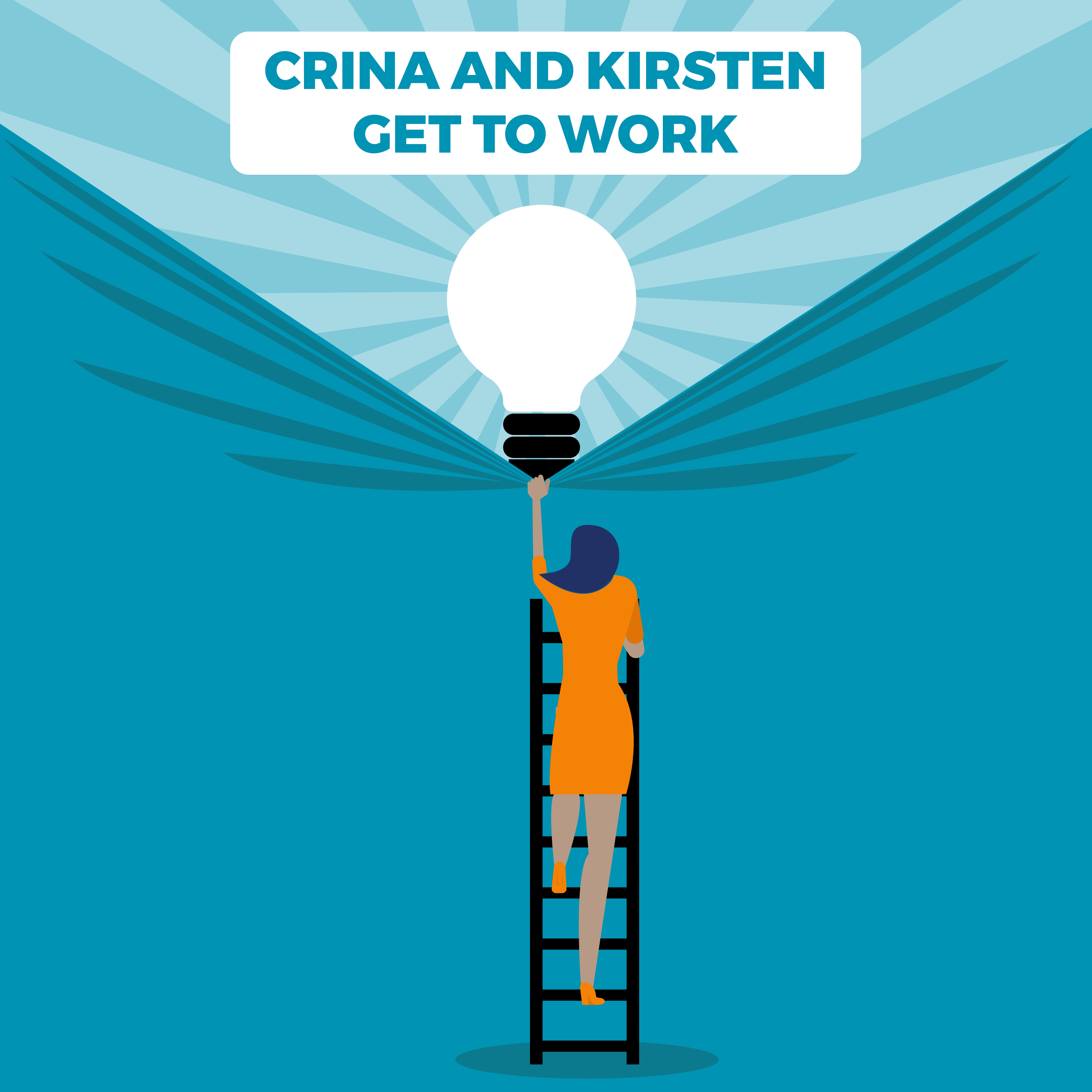Crina and Kirsten Get to Work

We have one single mission: Help women find ease, meaning and joy at work and in life. We use our experiences as business owners, entrepreneurs, mentors and inspirational leaders to explore topics that all working women care about: shitty bosses; smashing the patriarchy; balancing work and life; navigating change and getting what you want! We guarantee that you will be entertained and inspired... promise!
Episodes
Episodes



Friday May 20, 2022
Success is within your reach, but you need to define it first
Friday May 20, 2022
Friday May 20, 2022
Do you want to achieve the objective markers of success such as money, power and status? Perhaps you are seeking more subjective things such as challenging work, recognition or autonomy. Regardless of how you define success, the way to achieve it is through deep personal work, commitment and grit.
SHOW NOTES
What is success at work to you? You can think about a job well done, tasks completed, a healthy team, and you can also think on a larger scale about a successful career. The data shows that your definition of success changes as you get more experience, and is sometimes a reflection of where you live and who you live with - the external definitions of success can have a powerful impact on you. The focus of this episode is the big picture of success and a subjective definition that aligns with each of our values, allows for authenticity, makes the best use of our skills and talents and challenges us to grow.
Traditional markers of career success such as title, salary, promotions, and the like are great to a point, but they are not the whole picture and are missing some of the important considerations. Harvard Business Review points us to the subjective measures of success:
Performing work that we find interesting and fascinating
Overcoming challenges
Having autonomy in how you perform your work
Developing new skills and deepening existing ones
Having work and personal life complement and enrich each other
Being recognized as an expert
Having the trust of your colleagues and superiors
Building valuable relationships inside and outside of your organization
Contributing to shared knowledge in your organization by training others
Collaborating effectively with a team of talented colleagues
Receiving recognition for your achievements and contributions
Seeing the positive impact of your work on end users or on society
Leaving a legacy that you’re proud of
Success requires a growth mindset, goal setting and tracking, authenticity and self awareness and confidence. Success is a long trajectory and will come with setbacks and change - these are the prickly parts to embrace as we create our own versions of success. As we define success for ourselves and move in that direction by setting goals and monitoring our progress, it is important to remember the big picture and treat not only the achievements but also the learnings along the way as markers that we are on the path to success, as we each define it.
Rethink What You “Know” About High-Achieving Women (hbr.org)
How to write your own definition of success – step-by-step formula — Imogen Roy | Create a legendary life and never burn out again
Make Your Career a Success by Your Own Measure
5 Ways Success Can Change Someone | Psychology Today



Friday May 06, 2022
The Fairy Dust of Effective Teams - Psychological Safety
Friday May 06, 2022
Friday May 06, 2022
Teamwork doesn’t have to suck! In fact, magic can happen when team members tend to each others’ basic needs–most notably, their psychological safety. Psychological safety is the belief that you won’t be punished or humiliated for speaking up with ideas, questions, concerns, or mistakes. Seems like a direct line to ease, meaning and joy!
SHOW NOTES
On this episode of Crina and Kirsten Get to Work, our hosts tackle teams at work. For those of us who have been on good teams, we know the benefits:
collaborative problem solving leads to better outcome
we are willing to take more risks when we are supported by a good team and that leads to innovation
teams encourage personal growth, increase job satisfaction, and reduce stress.
The question is how to create great teams. Google, with all of its data and metrics and algorithms, conducted a five year study of its teams (called Project Aristotle) to try to distinguish what makes a good team versus a dysfunctional team. It turns out that psychological safety is at the root of what makes an effective team. Psychological safety is the belief that you won’t be punished or humiliated for speaking up with ideas, questions, concerns, or mistakes. The Google Study tells us about the core attribute of effective teams, but how do we create the special sauce of psychological safety.
According to Dr. Timothy Clark, author of The 4 Stages of Psychological Safety: Defining the Path to Inclusion and Innovation, employees have to progress through 4 stages before they feel free to make valuable contributions and challenge the status quo. The first stage is inclusion safety and is that basic need to connect and belong - which is really about bringing your unique self and being accepted to full participation in the group. The second is learner safety, which satisfies our need as humans to learn and grow - where we can ask questions, make mistakes, where failure is an opportunity and not a punishment. The third stage is contributor safety and is the place we satisfy our need to make a difference - it means we have a place to use our skills and talents. The fourth stage is challenger safety, which meets our need to make things better and to speak up to challenge the status quo - and requires the ability to effectively deal with conflict.
It turns out not only Google has concluded this concept of psychological safety is the hallmark of the most high performing teams, but so has Harvard University in a study of teams during Covid. What were these folks on effective teams doing? They were communicating more, particularly by phone, making an average 10 .1 calls per day as opposed to 6.1 for those teams who were less successful. They were also running more efficient meetings - agendas, meeting preparation - which set the stage for more fruitful interactions. These folks are also interacting with each other outside of work - the most effective teams were not always working together, but also playing together. The Covid success teams were also recognizing each other with more frequency - for good work, for meeting challenges and the like - not just management, but among each other. What we learned from the Project Aristotle Study was true here as well - the people on the successful teams felt they could be authentic at work.
This is a podcast about women and work and ease meaning and joy, so here is the juicy nugget about women and teams . . . Scientists at MIT, Carnegie Mellon, and Union College suggest the most efficient groups — the ones who are the best at collaborating, analyzing problems, and solving them the fastest and most effectively — had three things in common, one of which was simply that they had more women. Yesss! If we want more successful teams - just add more women - and of course psychological safety.
Good Reads:
The Secret To Efficient Teamwork Is Ridiculously Simple
The benefits of teamwork (as proven by science) - Work Life by Atlassian
What Google Learned From Its Quest to Build the Perfect Team - The New York Times
The Secrets of Great TeamworkThe benefits of teamwork (as proven by science) - Work Life by Atlassian
5 Things High-Performing Teams Do Differently
What Is Psychological Safety at Work? | CCL



Friday Apr 22, 2022
Are You Ready For The Future Of Work?
Friday Apr 22, 2022
Friday Apr 22, 2022
The post pandemic workplace is predicted to look very different from that of the past. With changes to our lives, our shifting priorities, the low unemployment rate, and the different expectations we have of our jobs, workers are driving change at a rapid rate. In this episode, we explore a new study that reveals the data that will likely shape our workplaces into the future.
SHOW NOTES
We know that work is changing. 58% of workers feel the pandemic forced them to rethink work-life balance and 25% of workers have changed jobs. According to a new report from Bain and Company, the new workplace is driving a significant change in the balance of power between employees and companies - and leaders are rethinking their approach to talent.
Bain & Company engaged in an in-depth research project to help us define the broader implications of the future of work and identified five key themes that will reshape work into the future.
Motivations for work are changing - the reasons we go to work are changing. With the decline in social institutions such as churches and social clubs, people are increasingly seeking out social connection at work. As countries become more prosperous, the importance of leisure activities rises. And of course - people are looking for meaning and a sense of higher purpose, including a commitment to
Beliefs about what makes a good job are changing - Bain & Company identified 10 dimensions of a job - and the dimensions are those factors folks consider in determining what makes a good job. These are factors such as how much of identity comes from work, how important status is, our financial motivation, autonomy, camaraderie, future orientation, variety, mystery and ability to make a difference. These dimensions led Bain & Company to conclude that while we are all different - there are six meta categories of workers: Operators, Givers, Artisans, Explorers, Strivers, and Pioneers.
Automation is rehumanizing word, which we see in automation, the ability of the internet to do our work for us and in new processes and technologies to make work easier.
Technological change is blurring boundaries of the firm in that we are almost always available to work and always always available to our personal lives.
Younger workers are increasingly overwhelmed. Younger workers have been exposed to political polarization, geopolitical tensions, and concerns about climate change, not to mention a pandemic.
And then our hosts take us through the best part of the study and report - so what? Bain & Company suggests that this means that employers get better at being talent makers as opposed to talent takers - which means more focus and investment in learning and a growth mindset. Employers will also need to stop managing workers like machines and manage for individuals. This means a greater focus on mental health and recognizing that mental health is a key component of overall worker health. Lastly, Bain & Company believes that successful firms will build an organization that offers a sense of belonging and opportunity for its many unique workers while remaining united through a shared vision and communal values. As workers, Crina and Kirsten believe recognizing what archetype we each are and what we need from work, engaging in ways to boost our understanding and experience with tech are both important for the worker. Oh - yeah - and they suggest being crazy kind to yourself because the world is bat shit crazy.
The Working Future: More Human, Not Less | Bain & Company



Friday Apr 08, 2022
Caring for Caregivers
Friday Apr 08, 2022
Friday Apr 08, 2022
Women occupy the majority of roles in education, social work and health care. We spend our work days caring for the young, old, sick, and infirmed. We teach, care, give, love, nurture, heal, and serve. Our work educates the next generation, provides a safety-net for the vulnerable, heals the sick, and feeds the hungry. This episode pays tribute to the women who hold up the world.
This episode of Crina and Kirsten Get to Work is in honor of and devoted to caregivers - those people, primarily women, who have devoted their professional lives to caring for others.
Caregivers always play an important role in our communities, but with Covid-19, they have played a superhero role.
The episode explores women as professional caregivers, what professional caregiver roles remain difficult to acquire despite the fact that women dominate these fields; the challenges in the workplace for caregivers and ways we can support caregivers.
When you listen to this episode, think about the news reports we saw on television during the pandemic showing the appreciation the Italians showed caregivers at the change of shift - applause, music and singing, hoots and hollers. If you are a caregiver, we hope you feel seen and celebrated and if you are not a caregiver, we hope to deepen your appreciation for these very important workers.
Good reads:
How Millions of Women Became the Most Essential Workers in America - The New York Times
Women in the labor force: a databook : BLS Reports
Why Don't People Care That Men Don't Choose Caregiving Professions? - Scientific American Blog Network
Women in health care suffer burnout disproportionately to men - ABC News
https://www.nytimes.com/video/opinion/100000008158650/covid-nurse-burnout-understaffing.html?smid=url-share
Caring for our caregivers during COVID-19 | American Medical Association



Friday Mar 25, 2022
Five Traits of High Achieving Women
Friday Mar 25, 2022
Friday Mar 25, 2022
High-achieving women accomplish their goals, are highly skilled, and get the most out of themselves and their experiences; whatever they may be. They approach their careers and their lives with five key themes: agency, authenticity, connection, self-clarity, and wholeness (according to research from the Center for Creative Leadership).
Agency is fundamentally about us being the captain of our own ship and shaping our lives (and our jobs). Ruth Mahoney, President of KeyBank Hudson Valley / Metro NY District, who is responsible for dozens of regional banks suggests being specific and focused in developing our careers. She believes it is important to make our aspirations known, and asking for and being open to feedback - and then actually doing something with that feedback.
Authenticity is about being genuine - showing up in all areas of our lives as who we really are. We can see this in Kathleen Tierney, Executive Vice President and COO of Chubb Insurance, in how she deals with a mistake. She recommends owning up and acknowledging the mistake and considering what we can do with the information we glean. Authenticity requires vulnerability and curiosity - and these are great tools to deal with our mistakes. When we are living authentically, mistakes do not destroy our view of ourselves, rather mistakes are information to consider. Because mistakes are necessary in achieving or learning almost anything, managing mistakes is critically important to achievement.
The study also found that connection with other humans is a characteristic of high-achieving women - both professionally and personally. Tierney tells us that personal relationships have been key to her success in the workplace, and we know from the study that relationships outside actually support us inside the workplace.
The study refers to this as self-clarity. Self-clarity comes from understanding our values, motivations, and behaviors. It’s the desire to have a greater sense of self. Stacy Musi, a black belt in karate and managing director of Chadick Ellig Executive Search Firm, believes that establishing credibility is key to achieving our goals. To be credible, we really need to understand ourselves. Musi’s advice on credibility is an interesting mix of self-clarity and authenticity.
The last aspect of high-achievement the study points out is wholeness - which is the desire for experiences beyond work and the integration of those experiences with our work lives. It turns out high-achieving women value multiple roles, life beyond work, and a broader definition of success. The study notes that high-achieving women can feel fractured and are sometimes concerned about whether they are living in the wholeness, but it is nonetheless of great importance. This is encouraging because it tells us that there is a path to having wholeness in our life, which may in the end be the definition of “having it all.”
These five characteristics of high-achievement show up as tenacity, competence, results driven, vision, a focus on strengths, understanding the power of failure and apologies, not sweating the small stuff, stress tolerance, and emotional intelligence.
As we create our own definitions of achievement and work towards whatever that is, these five characteristics are important tools as we build lives that create an opportunity for ease, meaning and joy.
Some Good Reads:
5 Key Themes for High-Achieving Women Leaders
The six personality traits of high-achieving women in the workplace (smh.com.au)



Friday Mar 11, 2022
Hack Your Job!
Friday Mar 11, 2022
Friday Mar 11, 2022
Workplace hacks can help you streamline your tasks, maximize your work space, adjust your attitude and even control your co-workers (just kidding!). Best of all, these tips and tools can get you closer to ease, meaning, and joy!
SHOW NOTES
On this episode of Crina and Kirsten Get to Work our duo discusses workplace hack - just those little and big things to make your work day easier and make way for meaning and joy.
Crina and Kirsten cover hacks for your body - everything from water to rescue remedy gum to the shelf stable lentils in your desk drawer. Our gals cover hacks for your sanity - particularly necessary when 9 out of 10 workers report that workplace stress impacts their mental health and 4 out of 5 employees report feeling emotionally drained from their work. The brain hacks involve getting outside, listening to music, finding 10 minutes to stare into space or look at pictures of puppies (it really works!).
And for those of us behind a computer - one study reported that a survey of office workers reported an average of 6.5 hours behind their computers - there are also some hacks about drafting emails, setting your automatic response and getting those groovy glasses.
And of course our hosts provide some productivity hacks - because we want to get it done so we can get to the things that most matter. Kirsten says to eat the big, hairy frog first - in other words - do the hard thing you do not want to do first. Hacks such as rewarding yourself when you get through a task, prepping for Monday on Friday (or Sunday if you are like Kirsten) and really working on not multitasking.
Crina and Kirsten suggest hacking your workplace environment - everything from whiteboard wallpaper to noise canceling headphones to plants in your workspace. 65% of workers report it is difficult to concentrate due to their work environment. If we can make our workplace environment more pleasing - it allows us to concentrate more fully.
And of course the biggest hack of all in how to create more ease, meaning and joy in your workplace - JUST SAY NO.



Friday Feb 25, 2022
Black Women At Work
Friday Feb 25, 2022
Friday Feb 25, 2022
In recognition of Black History Month, we spend some time considering the state of black women at work in America, and the racism behind it. In this episode, we will see that Black women are paid less, have fewer benefits, are promoted with less frequency and occupy fewer management positions than their white counterparts. We also ask ourselves, and our listeners to take action to address these disparities that permeate every workplace.
SHOW NOTES
This episode is full of contradictions, which reflects the racism Black women face in the American workplace. While Black women have always (and currently) participated more than white women in the labor force, regardless of age, marital status or the presence of children, they have not reaped the rewards of that higher level of participation.
Black women have been excluded from social programs because of their relatively high rates of employment as compared to white women, which is ironic when we consider the stereotype image of the black welfare mother with all the kids - turns out those programs did not even cover Black women when they began. Legislative protections for workers have excluded Black women because the industries they have typically occupied have been excluded, such as household workers and agriculture. Racism is many awful and injurious things, but it is also ironic.
Studies show this reality affects the way Black women feel about their work - and we know from prior episodes the importance of our perceptions about the workplace.
According to a Gallup poll, Black women are less likely to feel valued, less likely to feel they are treated with respect, and less likely to feel treated fairly at work than any other group. Despite these feelings, Black women remain highly ambitious and ready to succeed in the workplace.
Tune in to find out what organizations and individuals can do about racism directed at Black women in the workplace.
Good Reads:
Black Women in the Workplace
Black women’s labor market history reveals deep-seated race and gender discrimination.
The “Angry Black Woman” Stereotype at Work
Black Women's Equal Pay Day Equals An Extra 214 Days Of Work
SYSTEMIC RACISM AND THE GENDER PAY GAP



Friday Feb 11, 2022
Fear Is A Powerful Teacher
Friday Feb 11, 2022
Friday Feb 11, 2022
Fear has the power to motivate us to act; educate us about who we are; inspire us to change; and provide us with so very many opportunities to find ease, meaning and joy.
SHOW NOTES
Today on Crina and Kirsten Get to Work, we are talking about FEAR!! We can do this together - pour yourself a cup of tea and take a deep breath, let’s wade into the dark waters of fear and find the clear water.
Signposts for this episode:
How does fear help us?
How does fear stop us?
How does fear impact our brains? Our performance? Our motivation?
What do you do when you’re afraid?
What do you do to avoid the things you’re afraid of: work too much? Get angry?
Why Deal with Fear?
The first question you may ask yourself is why should we deal with big, hairy, scary fear? Because it gets in the way of leading our fullest lives. Remember the saying, “you miss 100% of the shots you don’t take.” If we are too afraid to take a shot, we miss it. And the amazing Nelson Mandela said, “The brave man is not he who does not feel afraid, but he who conquers that fear.” And one of our favorite stoics, Seneca, said, "We suffer more often in imagination than in reality." The quotations all tell us something about fear - what it gets in the way of, the benefits of conquering fear - and of course what we make up in our heads.
Addressing your fears allows you to be more of who you are in the world - oh yeah - and some of that ease, meaning and joy.
What is Fear?
At its basic level, fear is a physical and emotional response to some external stimulus. Sometimes the stimulus is known—like a loud, unexpected crash in the middle of the night—but often the trigger for fear is subconscious and is not easily traced, i.e. a dark basement or a steep ski slope.
Science tells us that some aspects of fear are evolutionary. In other words, we are hard-wired with a set of autonomic responses that have been critical to our survival. Other fears are conditional i.e. developed through a complex set of interactions with the world and often through observing the behaviors of others. It turns out there is quite a bit of debate about what we are born with and what is conditioned into us. And some of the conditioning comes from the stuff we keep telling ourselves.
Is Fear Positive or Negative?
Most of us think that fear is negative because it can stop you from doing things. Fear also has negative impacts on your physical health, memory, brain processing and mental health.
However, fear does have a positive side - the positive power to stimulate action and unlock potential. When we face our fears, acknowledge and give respect to the power within those fears (what is true), parce out what is not true and turn that power into action, we can make remarkable progress in our lives.
What are Some Workplace Fears
Workplace fears include fear of organizational change and fear of risk taking, which includes fear of failure, success, fear of what others will think, and fear of uncertainty. Sometimes we are afraid to speak up at a meeting, express an unpopular or new view or opinion, ask for that raise - just so many things.
How Do We Overcome Fear
Tim Ferris has a great exercise - that has taken from the stoics - to overcome fear - in fact, he is such a believer in this process he says people would be better off addressing fears than setting goals.
Tim suggests three sheets for this exercise.
On the first sheet define what you are afraid of, what are the worst things that can happen - try to come up with a column of at least 10 and closer to 20 awful things. For each of the awful things, figure out how you might prevent the awful thing in the second column or steps for a repair in the third column.
On the second sheet list all the benefits of an attempt, of partial success or wild success. Will you be rich and famous (if you want to), will you build confidence, learn skills, have an experience, free yourself from something?
One the last sheet list the cost of inaction - what will doing nothing look like in 6 months, a year or three years.
References and Good Reads:
(PDF) Fear as a strategy: Effects and impact within the organization
Impact of Fear and Anxiety | Taking Charge of Your Health & Wellbeing
Sigal Barsade - Knowledge@Wharton
Why you should define your fears instead of your goals | Tim Ferriss - Bing video

Crina and Kirsten Get to Work
Crina and Kirsten dish on all things related to women and work. Through engaging conversations and witty banter, they will inspire you to seize your power and create meaningful, joyous, fun and rewarding work in their business podcast. While exploring motivational podcast topics such as authenticity, shitty bosses, friends and negotiation, Crina and Kirsten lift up women and show the patriarchy “the hand” and “the finger”.








